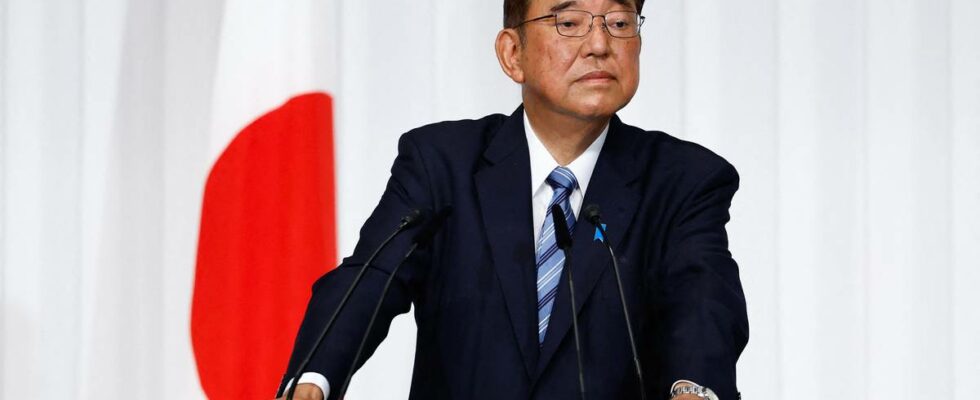Japan’s voters have lost patience with the party that has been in power almost continuously for nearly 70 years. It is clear in this election, because the Liberal Democratic Party (LDP) lost the majority in parliament. Joining the party is the small coalition party Komeito. The public’s trust is frayed, and with good reason: they have been served scandal after scandal. Voter turnout in Japan this time was 29 per cent at 6pm on election day. Photo: Eugene Hoshiko / AP Being investigated It was an embarrassing moment. Investigators raided the offices of the ruling LDP party last December. Those who control the world’s fourth largest economy were suspected of having pigs in the forest. That is to say, they should have misused large sums for their own gain. It started with meetings where money was collected. In Japan it is completely normal, and completely legal. Japanese Prime Minister Shigeru Ishiba gives a speech in the election campaign earlier in October. Photo: YUICHI YAMAZAKI / AFP Politicians and political parties sell entrance tickets to such meetings. Not least, large companies can buy many tickets to get close to politicians. The money goes towards renting meeting rooms, food and drinks. The rest goes to the host. The only requirement is that amounts above a certain sum must be reported. And this is where there were pigs in the forest. A poster with the party’s heroes marked the headquarters of the Liberal Democratic Party (LDP), just before the election. Photo: Hiro Komae / AP The accusations When the first accusations came, against five cliques in the ruling party, they all claimed that there had been a mistake. They were to review the accounts. The problem seemed quite manageable. It didn’t last long. It soon became known that the Abe clique, which was the largest, had received many millions of kroner over several years, without reporting the money. Large sums were given as bonuses to politicians who sold many tickets, without being reported. Former Prime Minister Fumio Kishida (tv), when he was Foreign Minister, and former Prime Minister Shinzo Abe, in 2020. Photo: Eugene Hoshiko / AP Not the only scandal The amounts are said to have been invested in slush funds, also called slush funds or bribery funds. Several cliques in the party must have done the same. Prime Minister Fumio Kishida promised to clean it up, but voters were not gracious. Support plummeted. Eight out of ten had lost confidence in the government. This was the biggest, but not the only, scandal. In the summer of 2022, Prime Minister Shinzo Abe was shot and killed when he spoke at an election campaign event. Tetsuya Yamagama was arrested shortly after he shot and killed Prime Minister Shinzo Abe on July 8, 2022. Yamagama said he killed the prime minister because of his ties to the Unity Church. Photo: Katsuhiko Hirano / AP Extortion Few politicians in Japan have been as powerful, popular and controversial as Abe. He was in power longer than any other Japanese, and it is therefore him that the largest clique in the party is named after. The killer explained that he killed Abe because the prime minister had political ties to the new religious movement, called Enhetskirken, or Unification Church. Her mother’s participation in the movement is said to have ruined her. Now the church came into the spotlight for blackmailing its members. It was described as a cult. It turned out that at least half of the politicians in the LDP had ties to the Unity Church. Japanese mourn Prime Minister Shinzo Abe at the site where he was killed in Nara, July 8, 2022. Photo: AP Political wash-up Rarely has a political assassination led to such an effective political wash-up. LDP’s politicians had to cut all ties to the church, and many were replaced. Prime Minister Fumio Kishida was unable to restore confidence in the party and ended up resigning. It is only a month since former Defense Minister Shigeru Ishiba was chosen to take over the helm. He called new elections, in the hope that the LDP would have renewed confidence, but just before the election came the next scandal. Several politicians fell out of favor because of the money scandal, but their local office is said to have nevertheless received funds from the party to run an election campaign. The opposition party CDPJ made a good choice, but not enough to take over power. Here, the head of the CDPJ, Yoshihiko Noda, runs to talk to his supporters after an election campaign speech in Saitama, October 22, 2024. Photo: YUICHI YAMAZAKI / AFP Clearly distrust Japan’s ruling party has thus moved from one political scandal to another, and the signal from the people is not to be misunderstood. They are exhausted. – It is a demanding situation. We have received a severe sentence, says Prime Minister Ishiba, who nevertheless does not resign. He promises political reform, that he will bring down prices, and strengthen relations with allies. – We have to respond to the criticism from the people. This is how I will take responsibility for the election defeat, he says. At the same time, the opposition party CDPJ is celebrating a strong election. It broke through the sound barrier, but the opposition is not united enough to be a real contender now. For most Japanese, the realization therefore remains: There is not really a good alternative to the LDP. Published 28.10.2024, at 19.27
ttn-69
The scandals have overtaken Japan’s ruling party – news Urix – Foreign news and documentaries

